A Space for Everyone
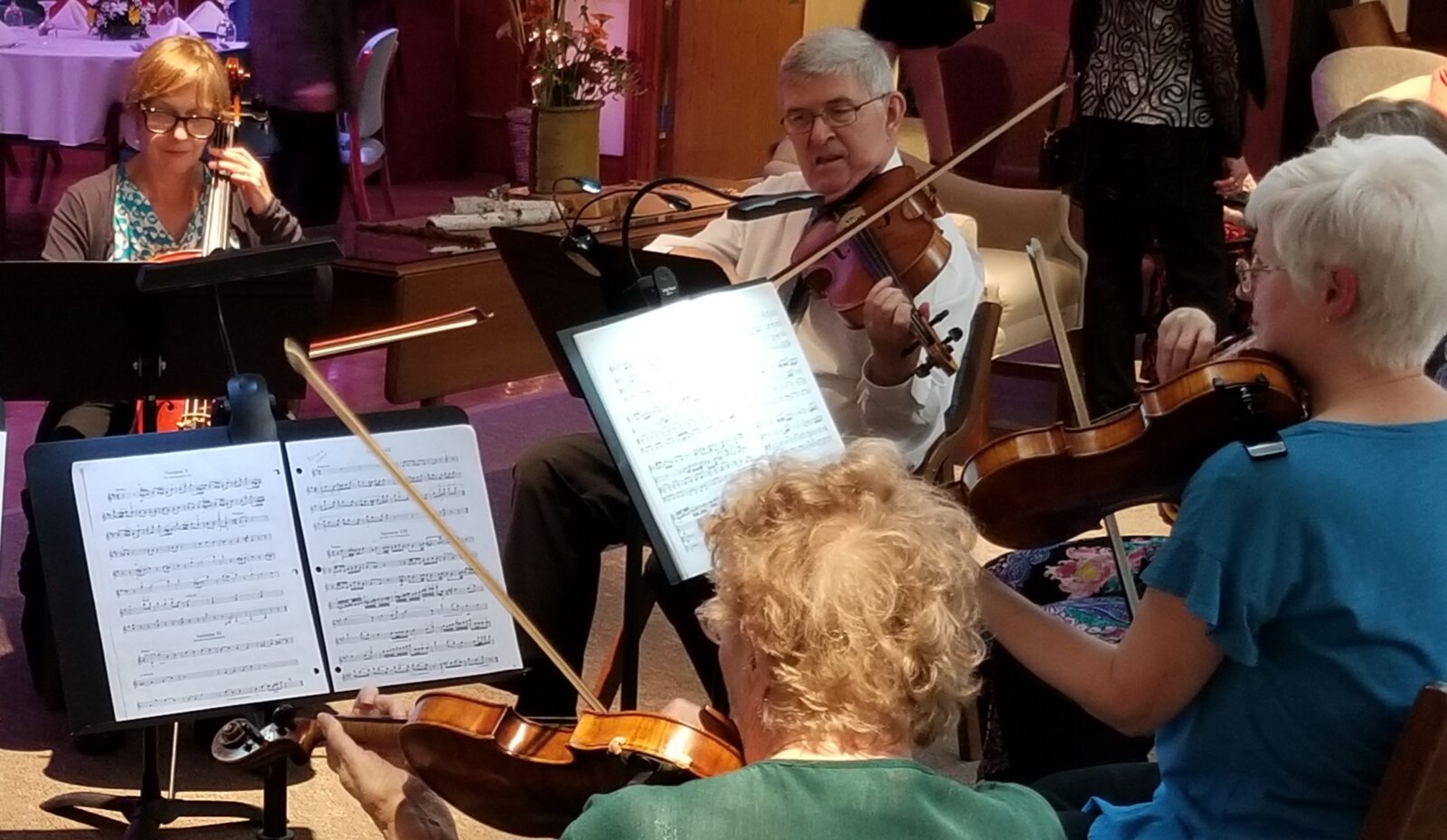
At a recent chamber music weekend, a friend and I had two completely different reactions to playing with an individual who clearly was having physical difficulties. These differences led to the exploration of the following questions: When should one put down one’s instrument? Should friends discourage friends from playing when their physical capabilities are compromised?
The weekend in question was a semi-annual meetup of roughly 60 string players and a few pianists. There are 3 sessions a day, 2 hours each, over the course of a long weekend. There are no entrance criteria. All are welcome to participate. Participants are placed in a different group each session and the group reads whatever music they choose. For those who want to prepare something in advance, there are suggestions provided. There is no coaching;
the only costs are lodging, travel and a very small administrative fee (under $100!). As would be expected in this context, the skill level varies dramatically, from people who are relatively new, inexperienced players to those at expert level who also attend top tier, highly selective workshops. Until the most recent weekend, however, I didn’t realize how wide the skill level might be.
In workshops such as these, where anybody can show up, I expect that I will get at least one bad session. In my definition, a “bad session” is one in which one or more players can’t follow the music or they play completely out of tune or they carry a tempo that doesn’t match anybody else’s or they can’t count, or, or, or….you get the picture. This happens at least once in these settings and is to be expected. In the most recent workshop, however, I was placed in
a string quartet with a violist, I’ll call him Mark, who had what I assume was a very pronounced essential tremor.
When I played with Mark I was completely distracted by the uncontrolled movements of his bow arm. He clearly had some physical issue and although he was playing, very little sound was coming out. When I did hear notes, they were always a bit behind where they should have been. I assume this also was due to a lack of motor control. I could hear enough to imagine that Mark had been at least a decent player at some point, but simply could not make it happen anymore.
With his spastic movements and barely audible notes always behind the rest of us, sitting next to Mark was hard. I had a difficult time focusing and staying with the other 2 players, trying to make music while distracted by the jerky actions happening to my left. I started to get irritated. I started to wonder who had let Mark be a part of the weekend. Who had let this guy in? Of course the answer was that the nature of this particular weekend is that everybody is allowed in. So then I wondered, why does Mark want to be here? Surely he knows that he can’t
control his bow. Surely he knows that his playing is not good — that he’s not making a nice sound or keeping up with the rest of us. So why is he here? Why is he exposing himself in this way?
There was only one answer that came to mind. He was enjoying it! He was having fun! He was appreciating what he was able to do rather than focusing on what he was unable to do. And along the way he was enjoying the camaraderie and personal connection that comes with playing chamber music. This realization allowed me to shift my own focus. My job during this session wasn’t to make beautiful music for all to hear. My job was to create a space where Mark could have the pleasure of playing. His distracting movements were still a challenge, but now, rather than being resentful about them I could have compassion and keep my eyes on my own music, allowing Mark to do his thing to the best of his ability. It was frustrating and difficult playing with Mark, but everybody in the group was kind. We prevailed and had a 2-hour session of string quartets that had some decent musical moments. I was exhausted from the efforts and reported as much to my housemates afterwards.
The next day one of my housemates – I’ll call her Connie – was assigned a session with Mark. Connie is an avid and accomplished chamber violinist. She is also one of the most prepared and conscientious people I know. After her session with Mark she begged us to promise that if she ever got to such a state as Mark’s that we would insist she put down her fiddle. She was absolutely adamant that she did NOT want to make others suffer by having to play with somebody so compromised; we absolutely were not to allow her to ever do so. The contrast between our reactions disturbed me greatly, and it took several days for me to figure out why. Why had the two of us had such different reactions to playing with the same perfectly nice but physically challenged person? Connie is not an unkind person, but she does expect a lot of herself and, my extension, of others. Her request, in fact, was to prevent the suffering of others. I listened, but was silently unwilling to make that promise. Why? And why did the request stick with me for days? As I thought about this, flashbacks to conversations with other musicians came to mind.
There was the conversation with Phyllis at a continuing care retirement community who had just gotten back from playing duets with Stacy, who was in the nursing home section. Stacy couldn’t really play anymore, but she absolutely loved whenever Phyllis showed up with her violin and offered to play duets. I got the impression that not much music came out during those sessions, but Phyllis went with her violin once a week and “played duets” with Stacy, much to Stacy’s delight.
I also thought about the story of Daniel, who had been a very accomplished cellist and was now living in an Alzheimer’s ward. His daughters, one a violinist, the other a violist, visit often, bringing their instruments. When they ask Daniel if he wants to play he will happily toddle over to an armless chair, plop down with legs spread, and one of the daughters will place his cello “in position”. Sometimes Daniel doesn’t make it past playing scales; sometimes some form of duet gets played. But whatever actual music comes out doesn’t matter. Daniel’s eyes light up at the suggestion of playing the cello. No matter the sound produced, it still brings him great joy. From these stories and my experience with Mark I now understand that, at least for me, the music we hear with our hearts is always more important than the music we hear with our ears. This may not be true for everyone and it certainly isn’t true in all situations. We attend performances by world class ensembles expecting amazing music to enter our ears. And for some, the pursuit of audible perfection may be most important. But through this experience I came to understand that for me, the music we hear with our hearts is always more important than that which we hear with our ears. This was a profound realization and it explains a lot of my willingness to let go of perfection when playing in groups. What I had previously labeled in myself as laziness, or not caring enough to make the most perfect music possible, I now understand in a completely different light.
We often hear about including younger people and offering exposure for them to play with more experienced players. But what about players on the other side of that mountain – those whose capabilities are declining, not ascending? While there absolutely is a need for workshops that are selective, where the capabilities of players are well matched and where the goal is to create the best possible music, we also benefit when we provide space for those who don’t play as well as they once did.
To the questions of when one should put down their instrument or whether friends should tell friends that they should no longer play, I would say that we should keep playing as long as we enjoy it. As friends, we may want to direct people with compromised capabilities toward inclusive workshops and away from those that are more competitive. We may want to find places where kindness matters more than the quality of the sound being produced and discourage application to a Manhattan String Quartet Intensive, for example. I now understand
that just the act of playing can be what is most important.
What comes out in audible form doesn’t always matter. The social interaction and the remembering of what one has enjoyed throughout life can sometimes matter more. The playing of an instrument, no matter how poorly,
allows one’s soul to sing. And it’s important to have a space for this to happen.I am grateful to have had my experience with Mark. I am grateful that there is a place where he feels comfortable and where he can be accepted. I am grateful that my friend Connie was open about her concerns. Because now, Connie, I promise you this: Should your physical capabilities ever decline to the point where it might be miserable for others to play with you, as long as you wish to play, as long as it would be fun for you, as long as it would give you pleasure, it will be my honor to make music with you. I will close my ears, open my heart, and we will make beautiful music – no matter how it sounds. All names have been changed to protect the privacy of the participants.
More Articles
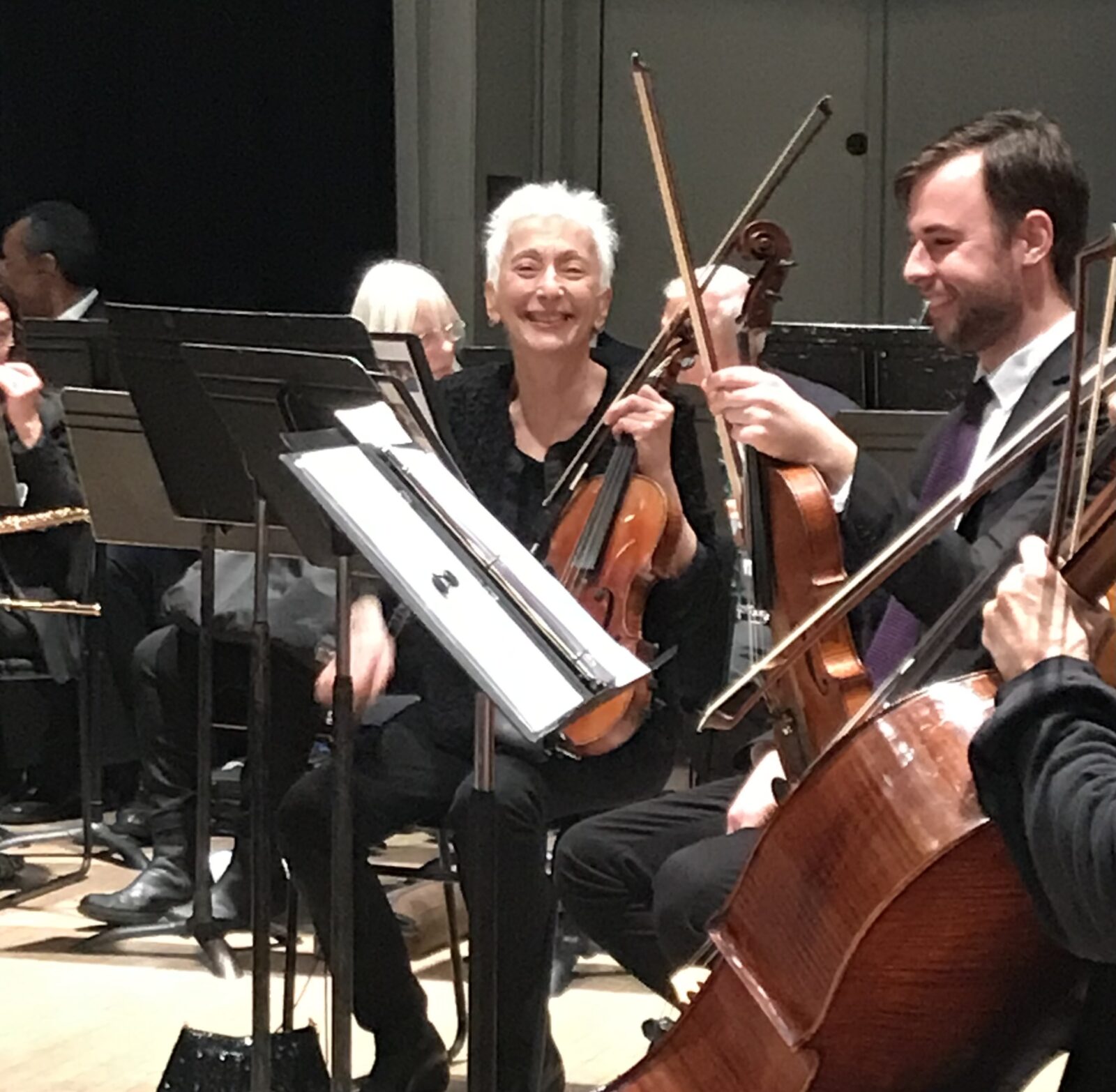
The day my quartet played out of tune and almost got our host evicted
Chamber music can be a high stakes activity - play a bit out of tune, and your host could end up on the street. Read about one such close call in New York City.Read More ↗
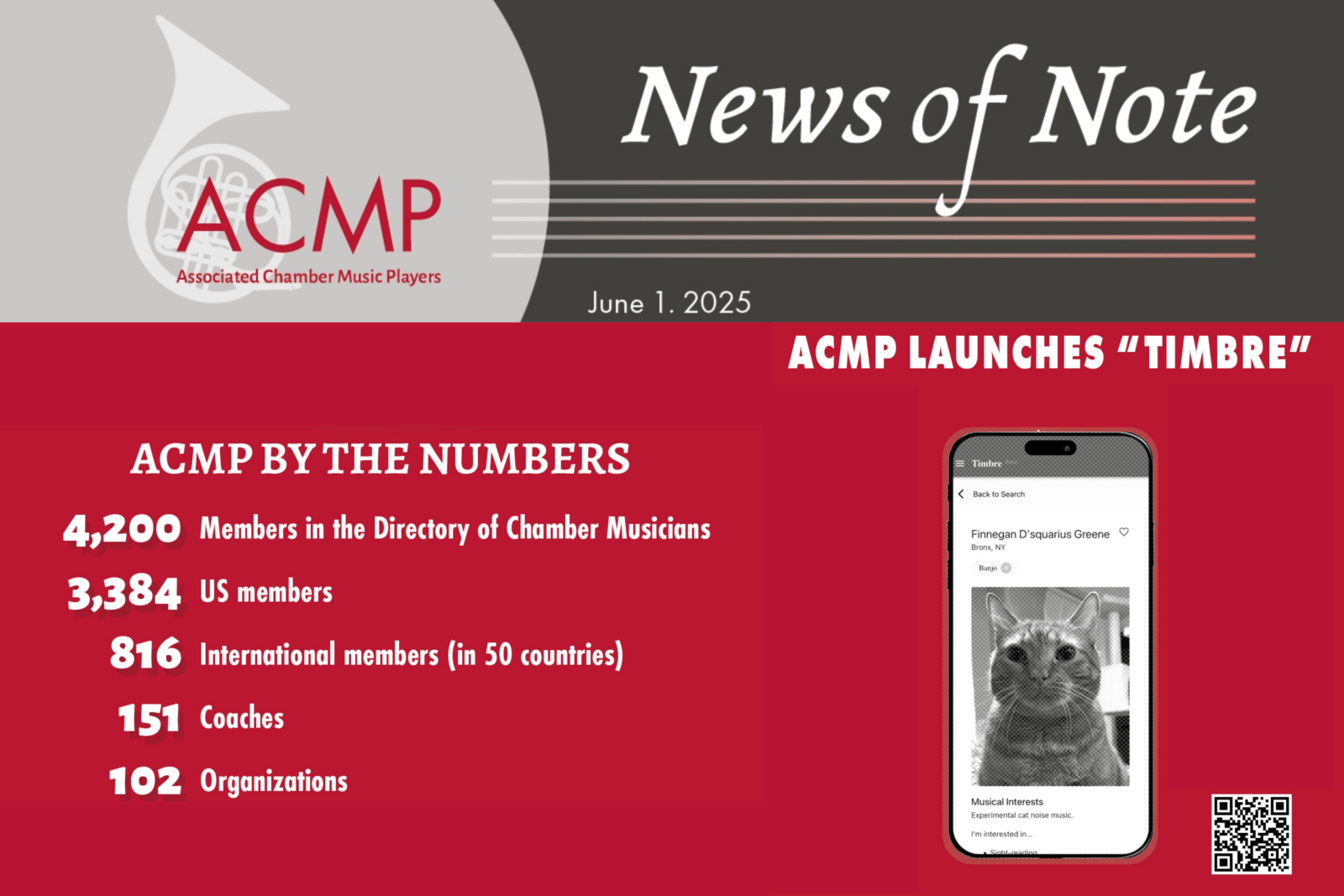
News of Note 2025
It’s that time of year again! The web version of the 2025 News of Note is live, featuring updates from the past year—and some fun extras, including everyone’s favorite: a new puzzle. (Submit your answers by July 1!)Read More ↗
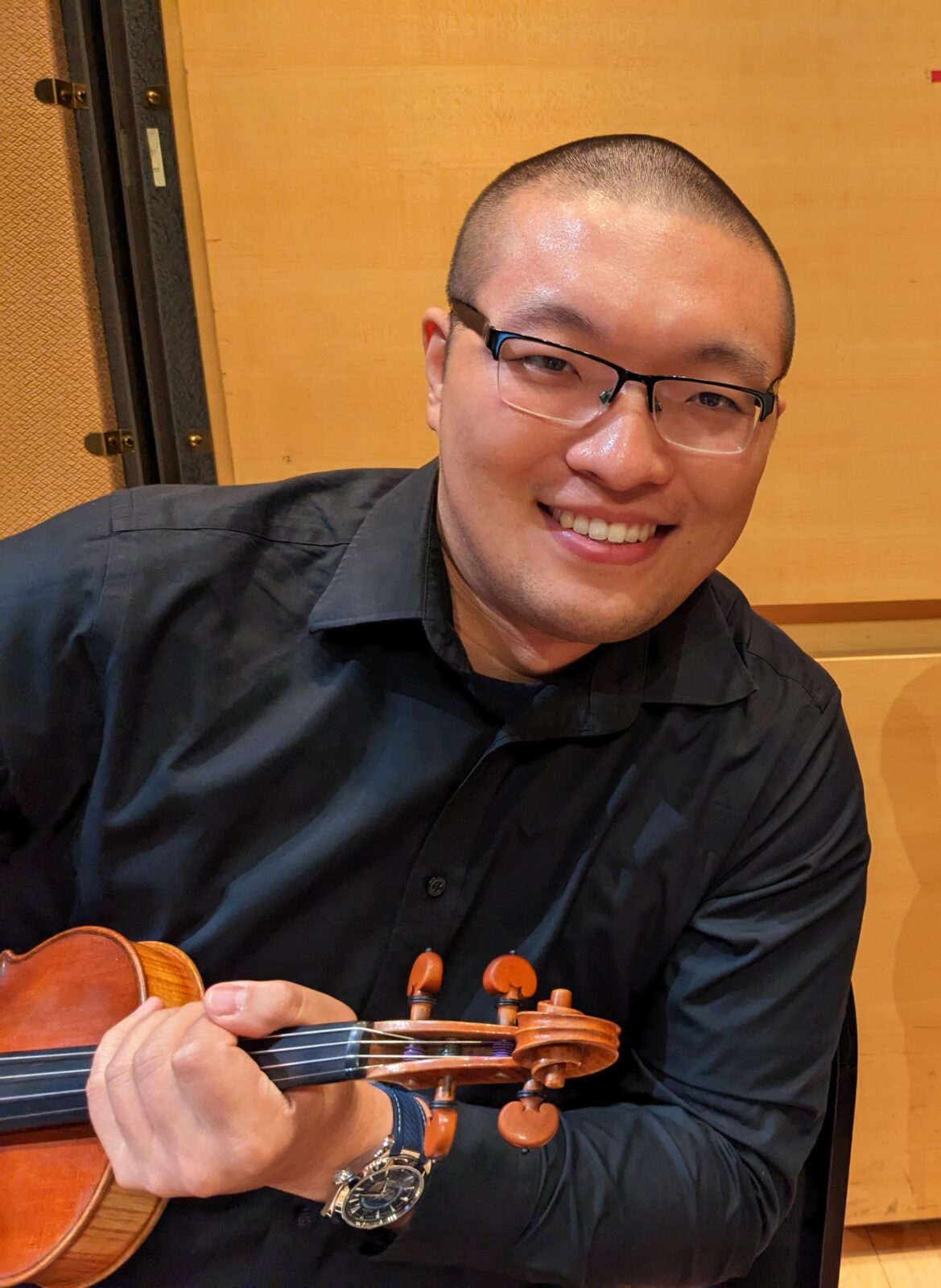
Member of the Month: Frank Song
Frank Song, 28, may work remotely as a software engineer, but when it comes to music and the arts, he is all about being there, in person. With the flexibility to travel in his work, he seeks out concerts or museum exhibits in cities far beyond his home in Toronto. And while he’s at it, he takes along his violin to play chamber music. We caught up with Frank on a recent visit to New York, where he played chamber music with people he found through ACMP.Read More ↗

Seasoning for the Seasons
With a taste for adventure and a pinch of whimsy, follow ACMP cellist Tom Cappaert’s lead: stage a chamber concert in a Quito pizza parlor.Read More ↗
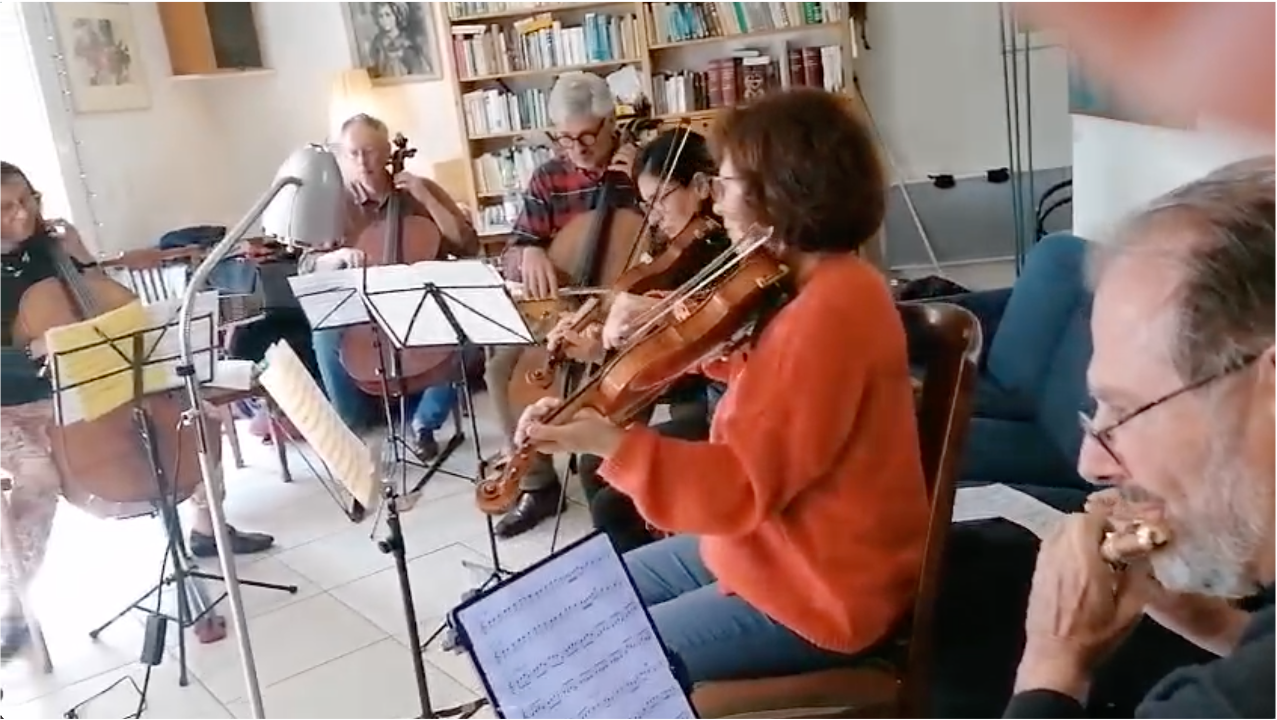
May 2025 Play-In Highlights!
Highlights from just a few Play-Ins during National Chamber Music Month!Read More ↗
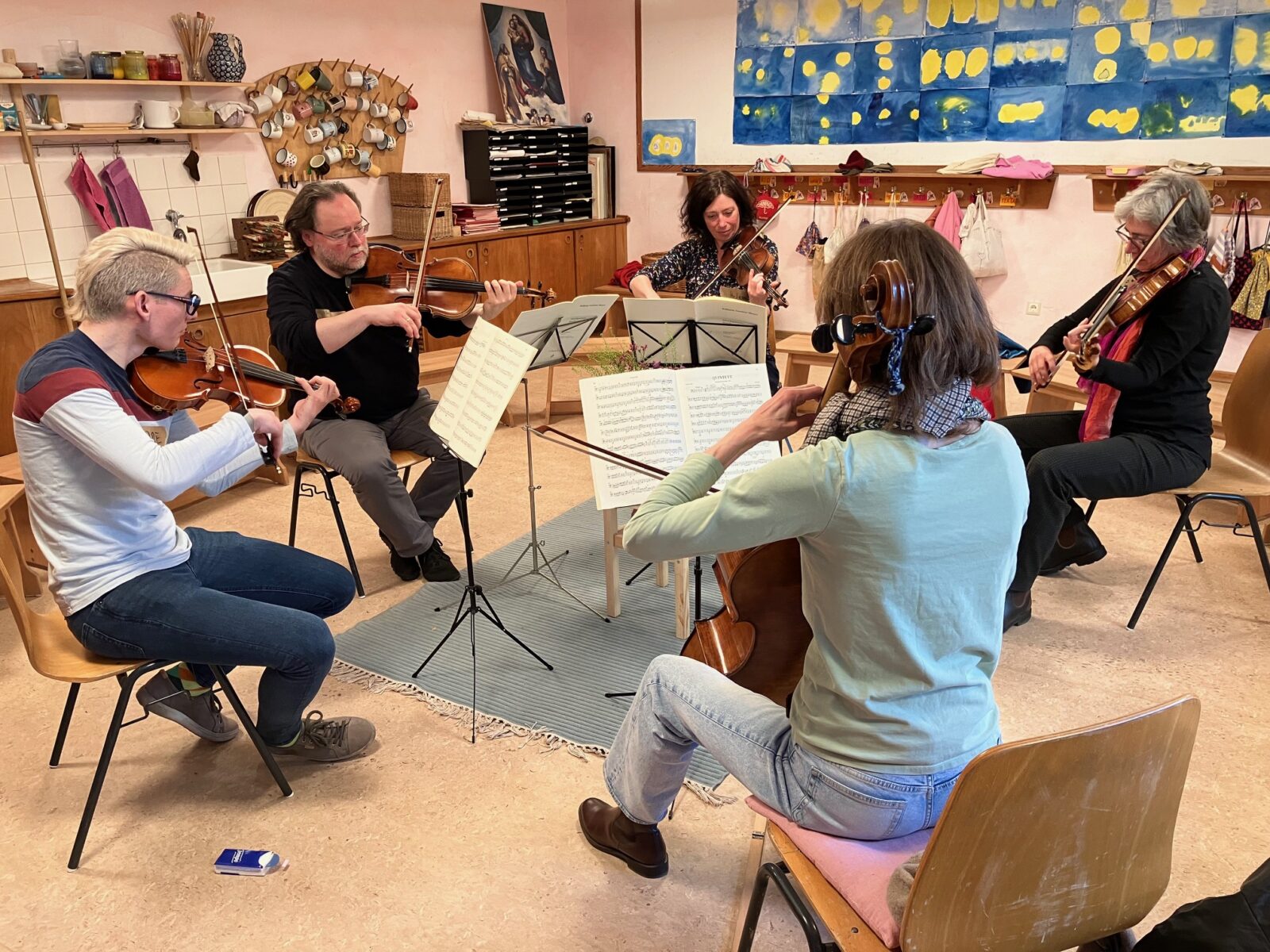
Play-In Report: Berlin Kammermusik Liste
Michael Knoch runs the Berlin Kammermusik Liste, and represents ACMP as its International Ambassador in Germany. He holds at least two Play-Ins a year, and has a unique gift for organizing large Play-Ins with a mix of all instruments and voice. Read about his second Play-In of 2025!Read More ↗
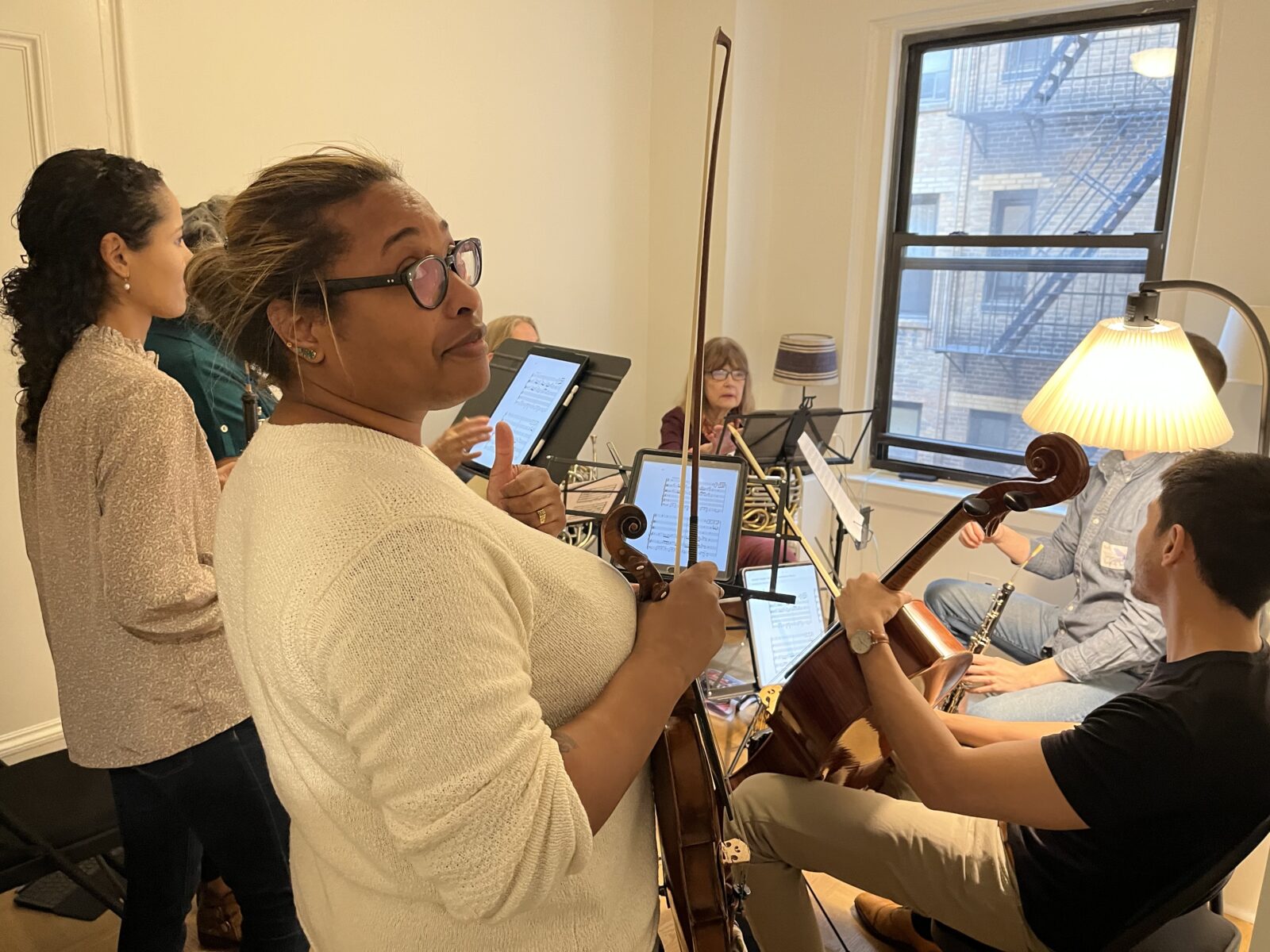
2025 Worldwide Play-In Events
May is Chamber Music Month! Celebrate with Play-Ins all month long, and during the Worldwide Play-In Weekend: May 16-18, 2025. See this list of Play-Ins in the ACMP Directory to date, and keep checking it for updates.Read More ↗
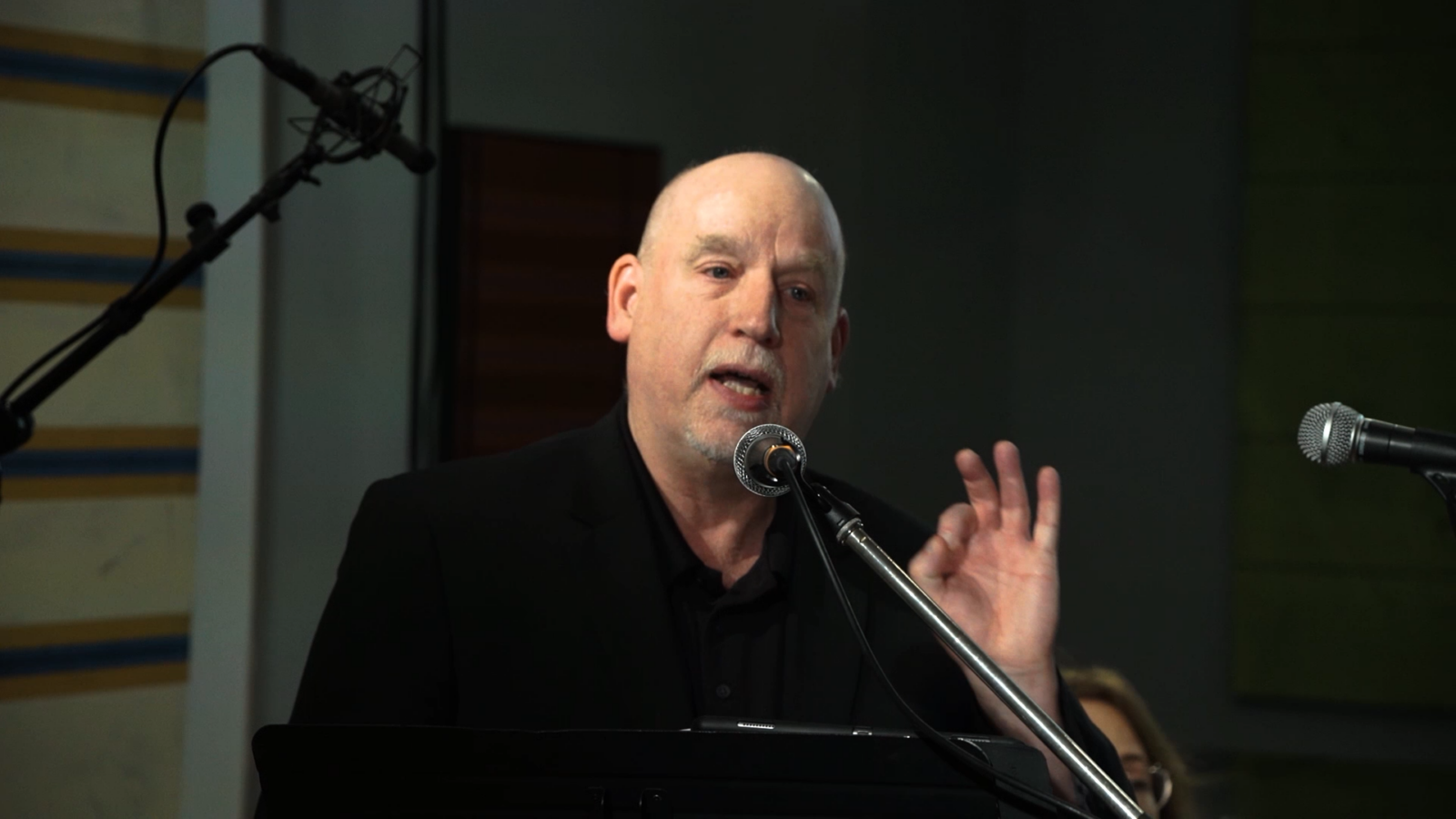
New Video: Ravel’s String Quartet with Cal!
Cal Wiersma is back, sharing ensemble tips and tricks through the lens of Ravel’s String Quartet.Read More ↗
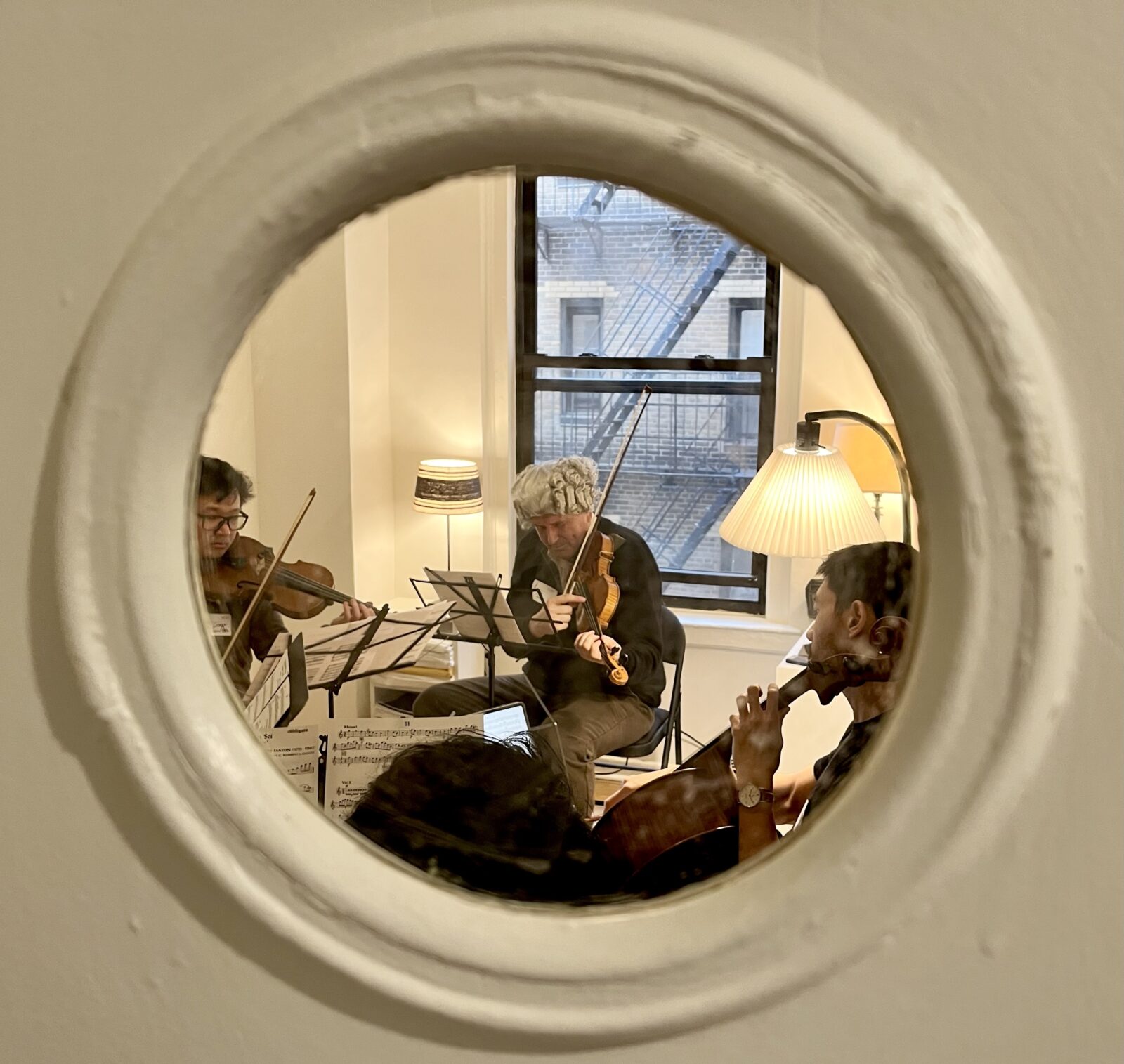
Here’s looking at you, Joe!
One day before Haydn's 293rd birthday - a Haydn party happened in Manhattan. Haydn himself appeared (in the form of ACMP violinist, board member and host, Bob Goetz.) 30 players participated - one third of the participants were wind and brass players! Read about the party and get some fun repertoire ideas!Read More ↗
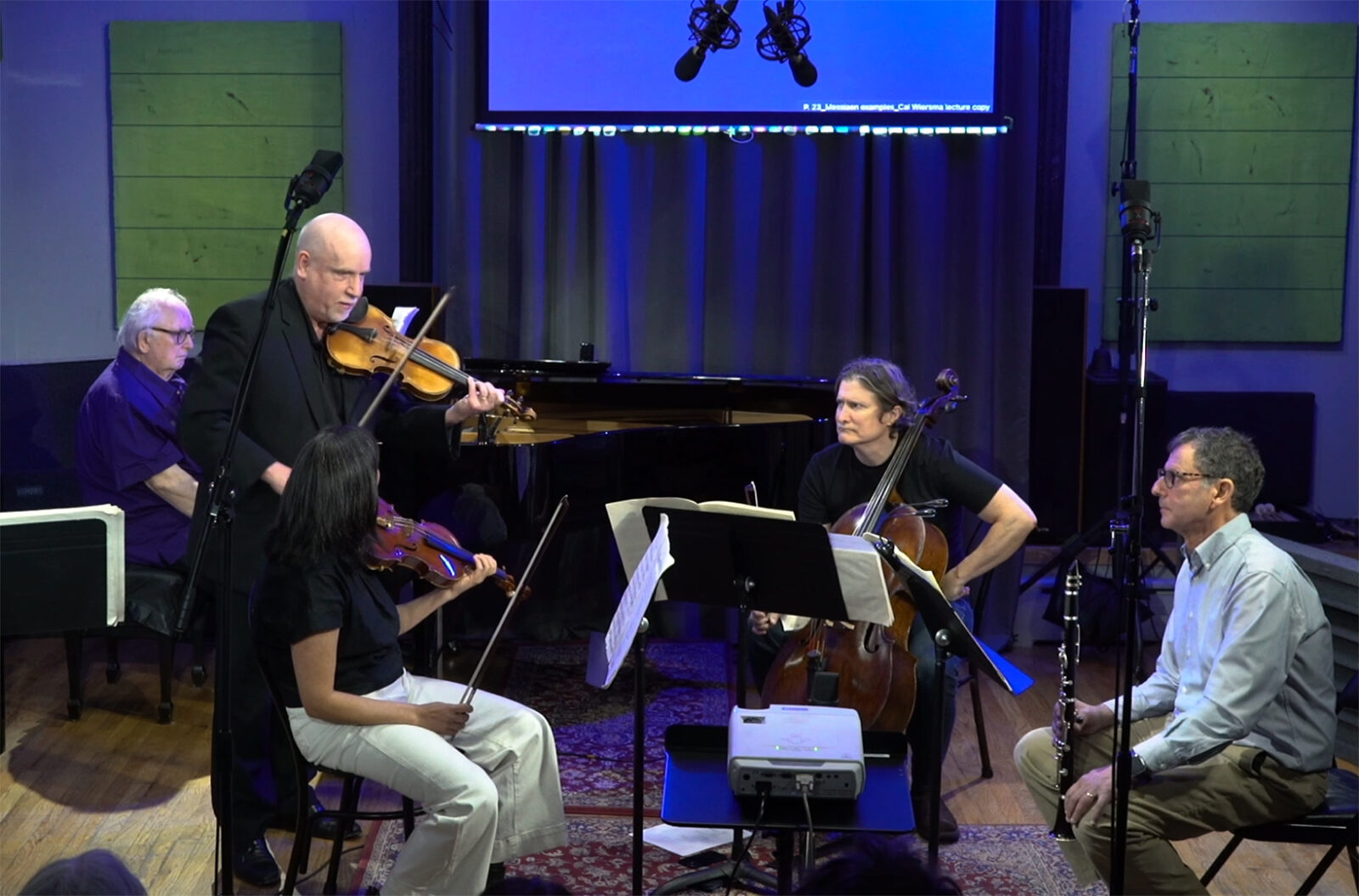
Cal Wiersma Class: Rehearsal Techniques in Ravel’s String Quartet
Back by popular demand - ACMP is offering another live and live-streamed class with violinist and chamber music coach Cal Wiersma on chamber music rehearsal techniques in Ravel's String Quartet on Sunday, April 6 at 3pm ET.Read More ↗
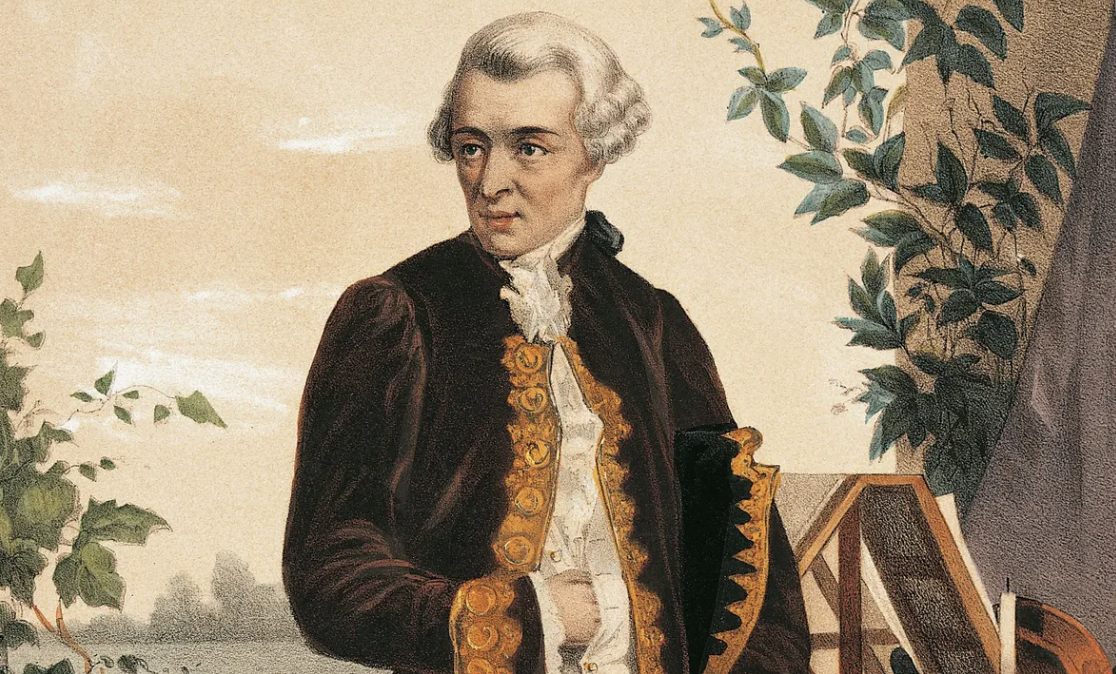
The 2025 ACMP Haydn Challenge
March 31 is Joseph Haydn’s birthday! It’s also a fabulous occasion to celebrate his contributions to the world of chamber music with a gift in his honor to ACMP…Throughout the month of March, we hope you will participate in the ACMP Haydn Challenge.Read More ↗
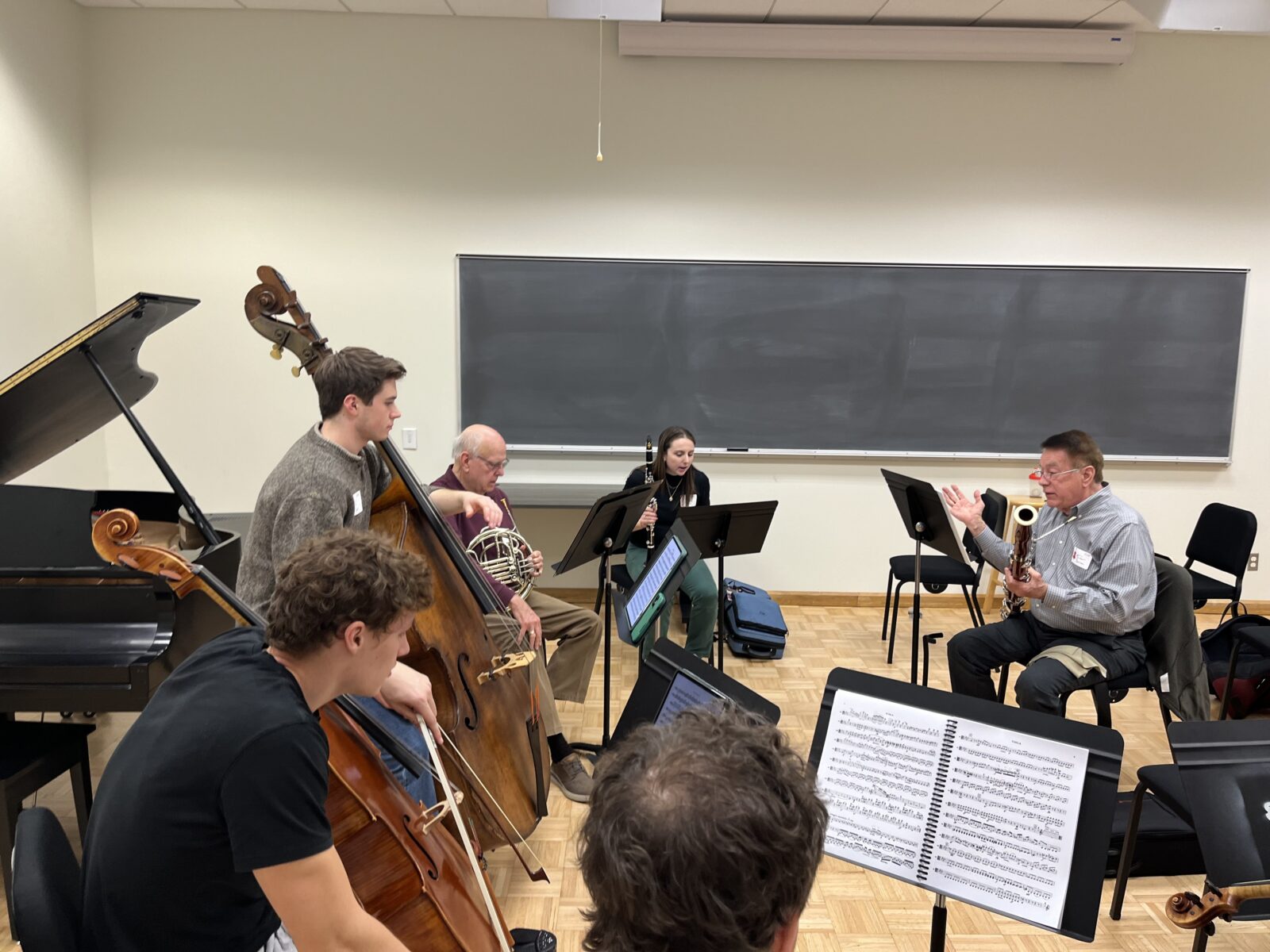
Post-CMA Conference Recap 2025
The CMA Conference in Houston—four days of nonstop music, inspiring connections, a jam-packed ACMP Play-In and a surprise woodwind trio at the Menil Collection!Read More ↗

New Listening Club Video: Exploring Brahms Piano Quintet in f minor, Op. 34
Out now! Watch the video recording from our recent Listening Club event with Peter Fender returning and going through Brahms’ Piano Quintet in F minor, Op. 34—an arrangement of an arrangement.Read More ↗
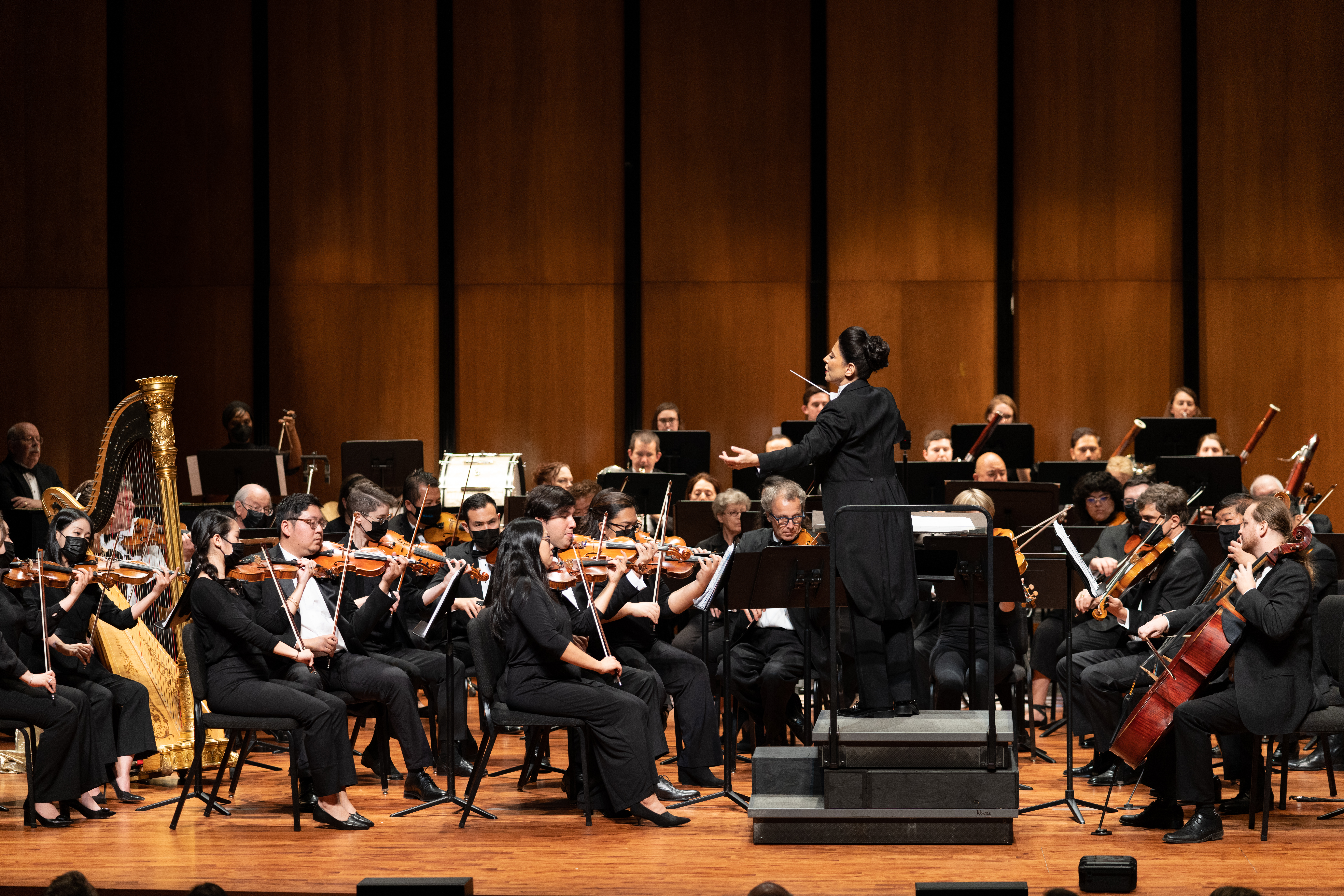
An orchestra born out of one woman’s dream
Over the course of its 25 years, the Texas Medical Center Orchestra has earned national acclaim in becoming a fixture of the Houston musical community. But how it got to this point can be traced to the vision of one woman—Libi Lebel, who moved to the Houston area in the late 1990s as an aspiring conductor and simply wanted to find a group to lead.Read More ↗
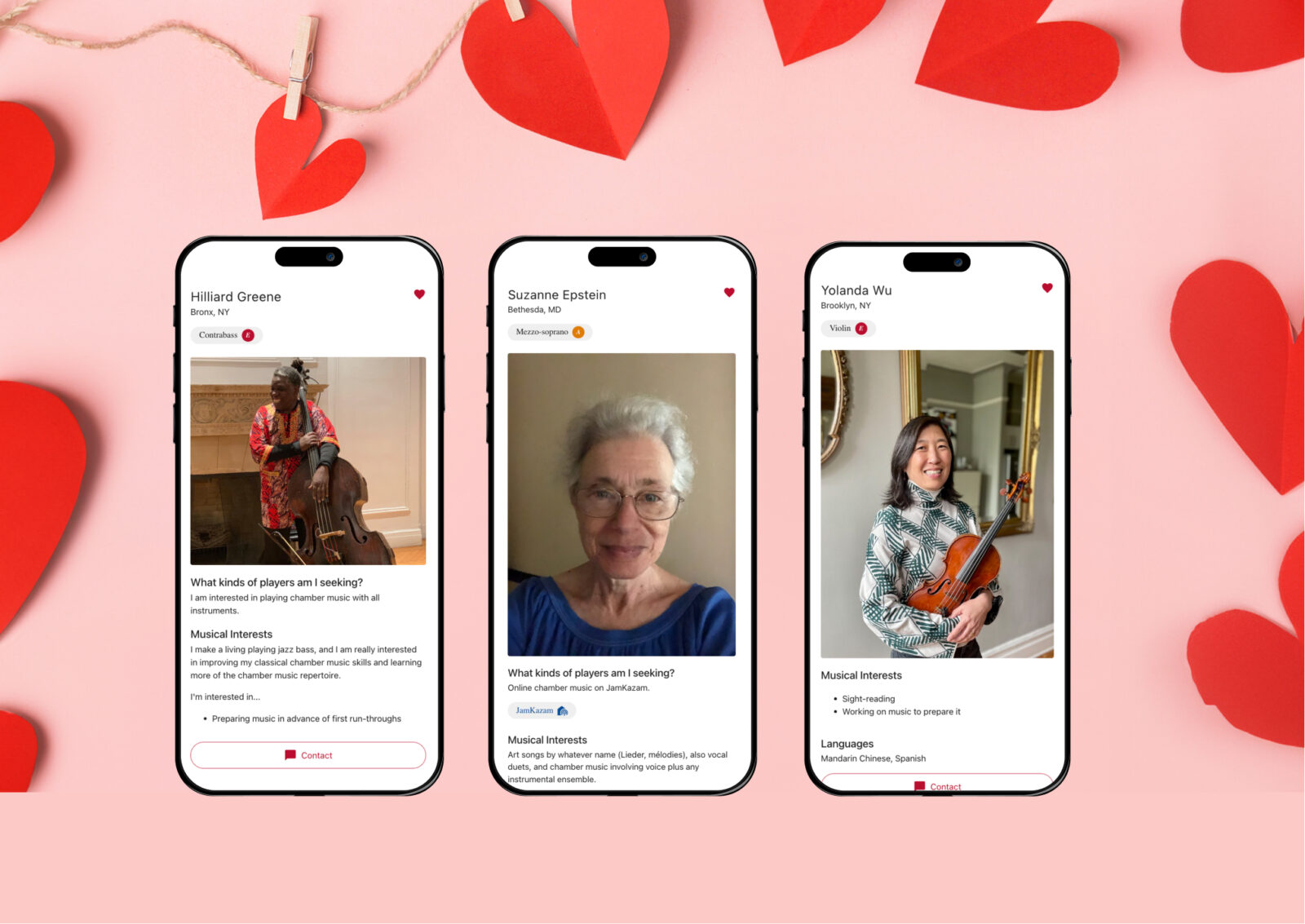
And it’s launched! The new Timbre web app
Just in time for Valentine's Day, ACMP is launching its new Timbre web app. Here's how to find it - and some handy tips on how to use it, too.Read More ↗
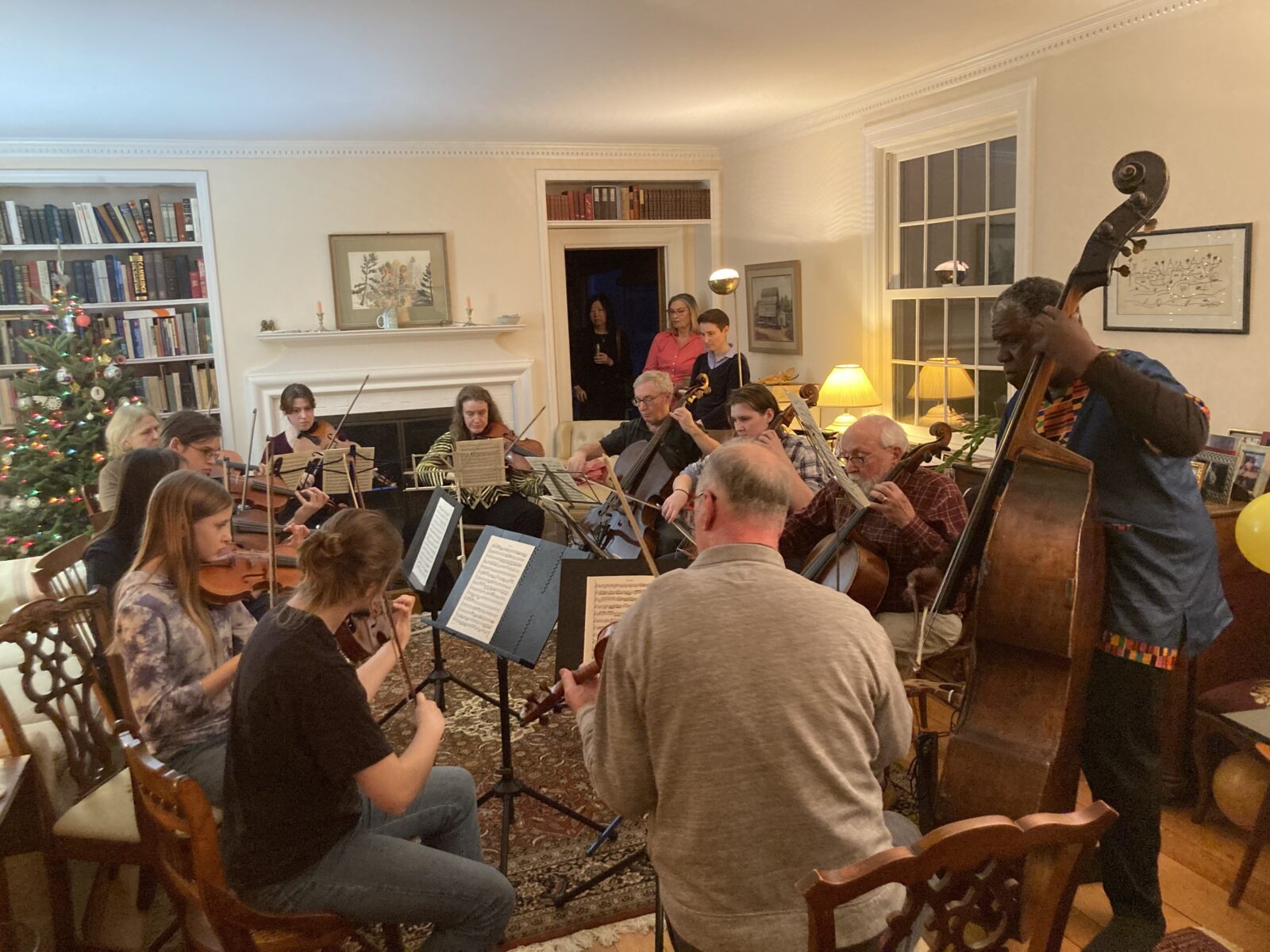
Celebrating the holidays with chamber music!
Looking back on a festive holiday season,ACMP was especially inspired this year by how many of our members made music together in their homes as part of their celebrations. ACMP Executive Director Stephanie Griffin attended two of these, and a special jazz party on New Year's Day.Read More ↗
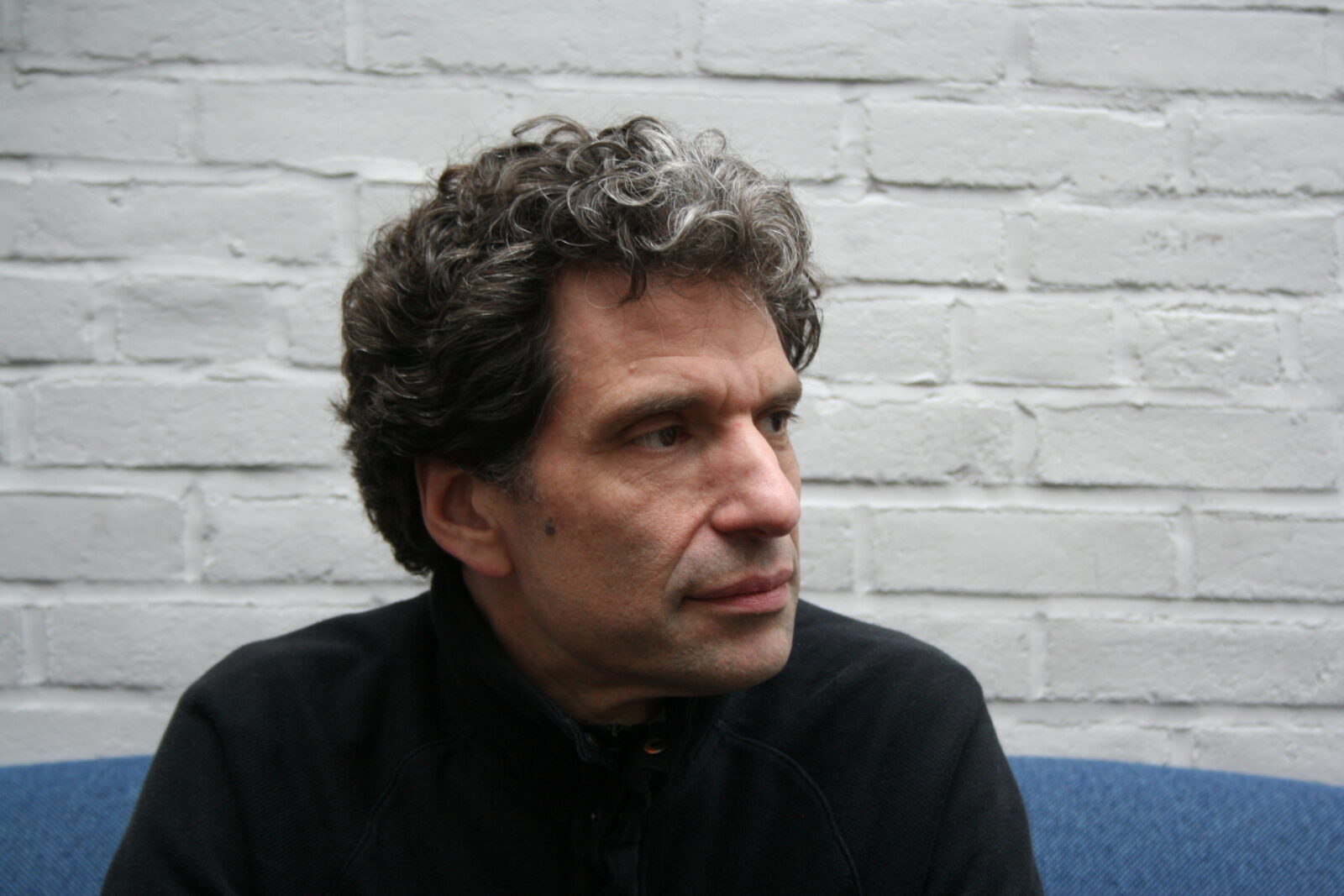
ACMP member discount on Seth Knopp’s new course “Music Speaks”
Join pianist and Yellow Barn Artistic Director Seth Knopp in New York City for a unique new music appreciation course "Music Speaks" on February 22 and 23 and March 1 and 2. And enjoy a 20% discount as a member of ACMP!Read More ↗
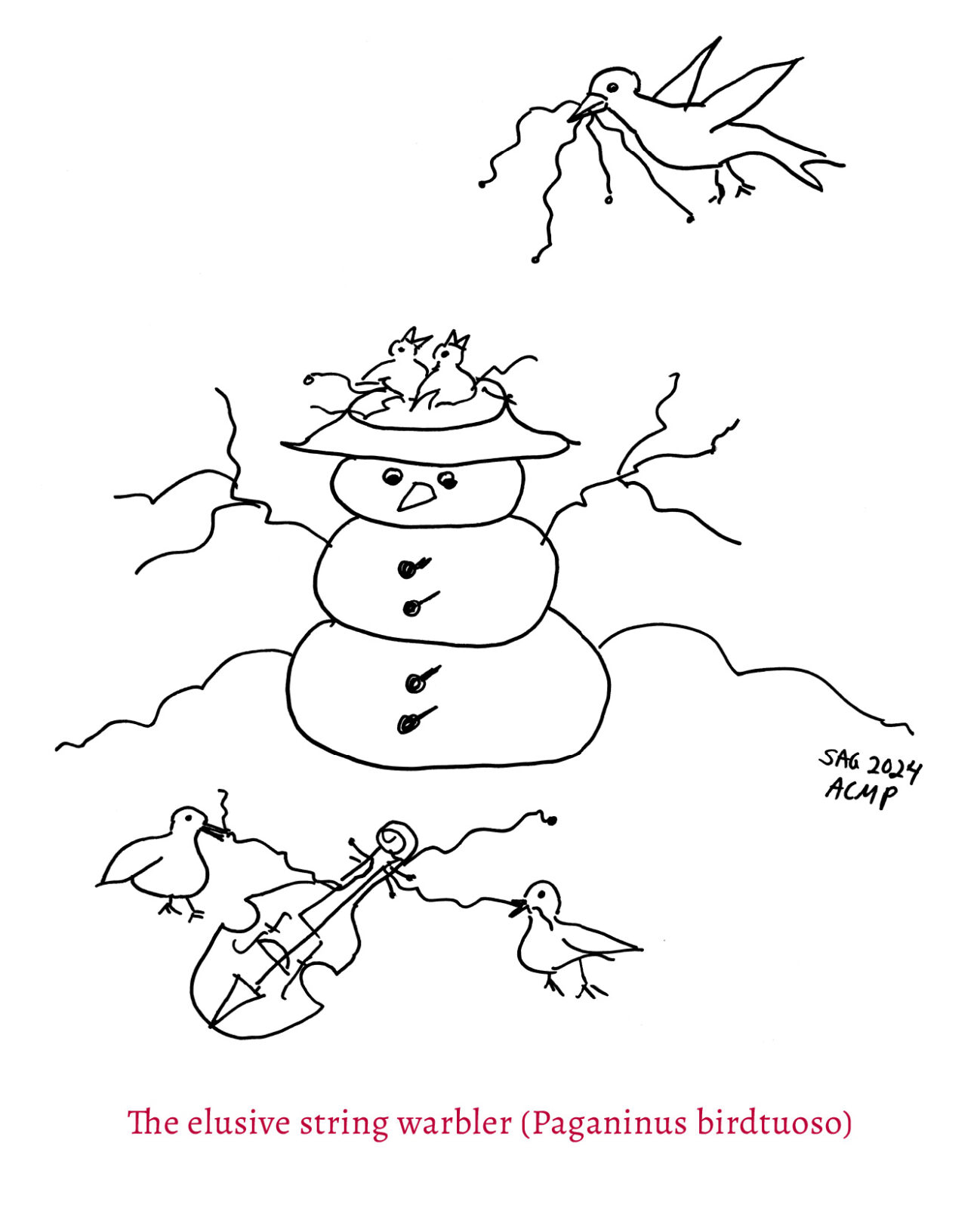
Announcing the 2024 Holiday Caption Contest Winners!
ACMP's 3rd annual Holiday Caption Contest was a success, with 61 captions from 32 ACMP members. This year's winners are Christopher Minarich, Ben Flanders and Susan Alexander. Congratulations to everyone who came up with so many wonderful captions for this year's cartoon!Read More ↗
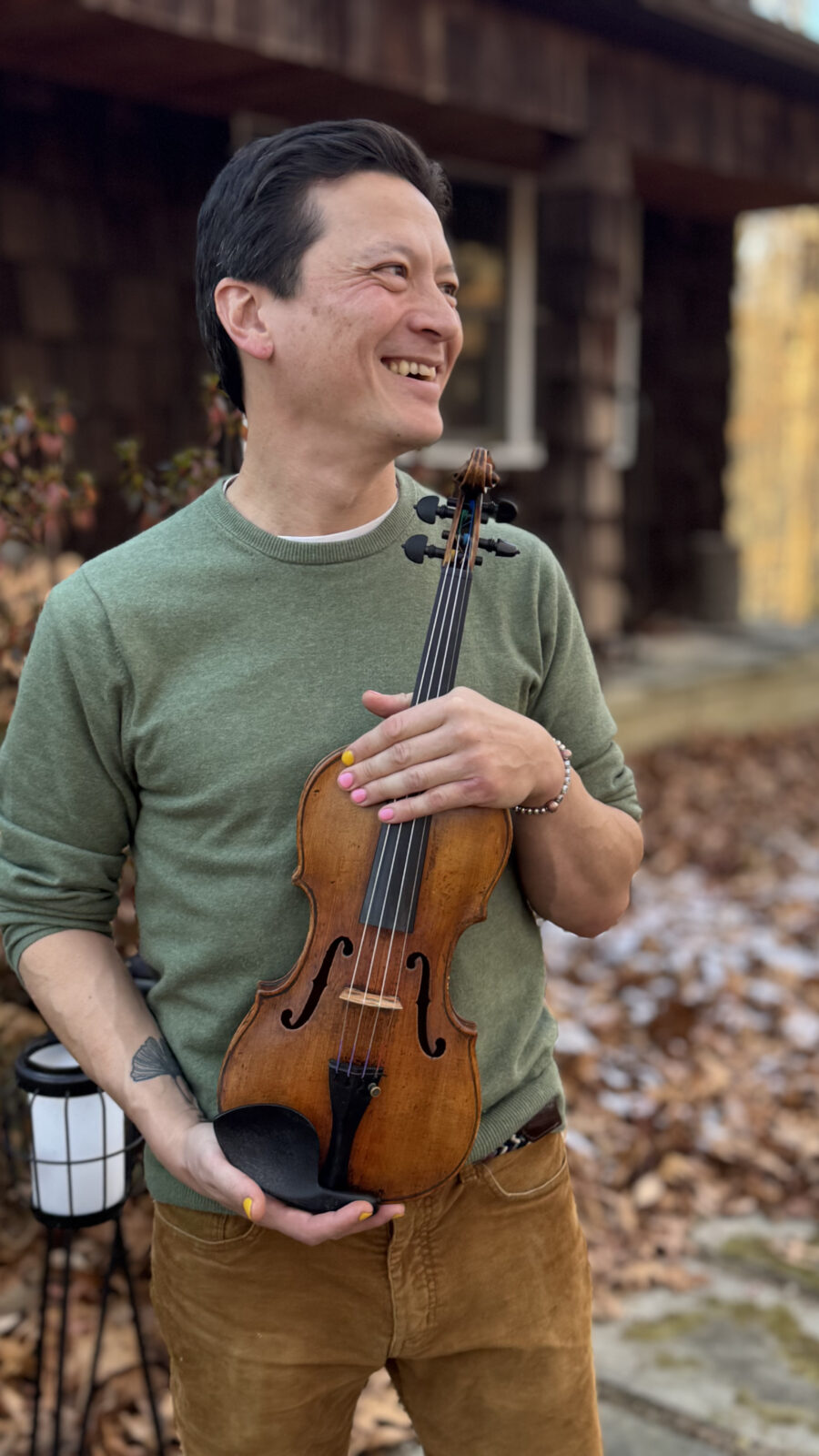
In conversation with Kenji López-Alt: Chef, Food Writer and Amateur Violinist
Kenji López-Alt is a renowned chef and James Beard Award-winning cookbook author. Perhaps he is best known for his work as a New York Times food columnist and the Chief Culinary Advisor for Serious Eats, and for his adventurous cooking videos on his own YouTube channel. But did you also know that Kenji is a life-long violinist and passionate amateur chamber musician? And that you can hear Kenji’s keynote address and play Brandenburg concerti with him and a festive mix of professional and amateur players at the Chamber Music America Conference in Houston on Saturday, February 15?Read More ↗
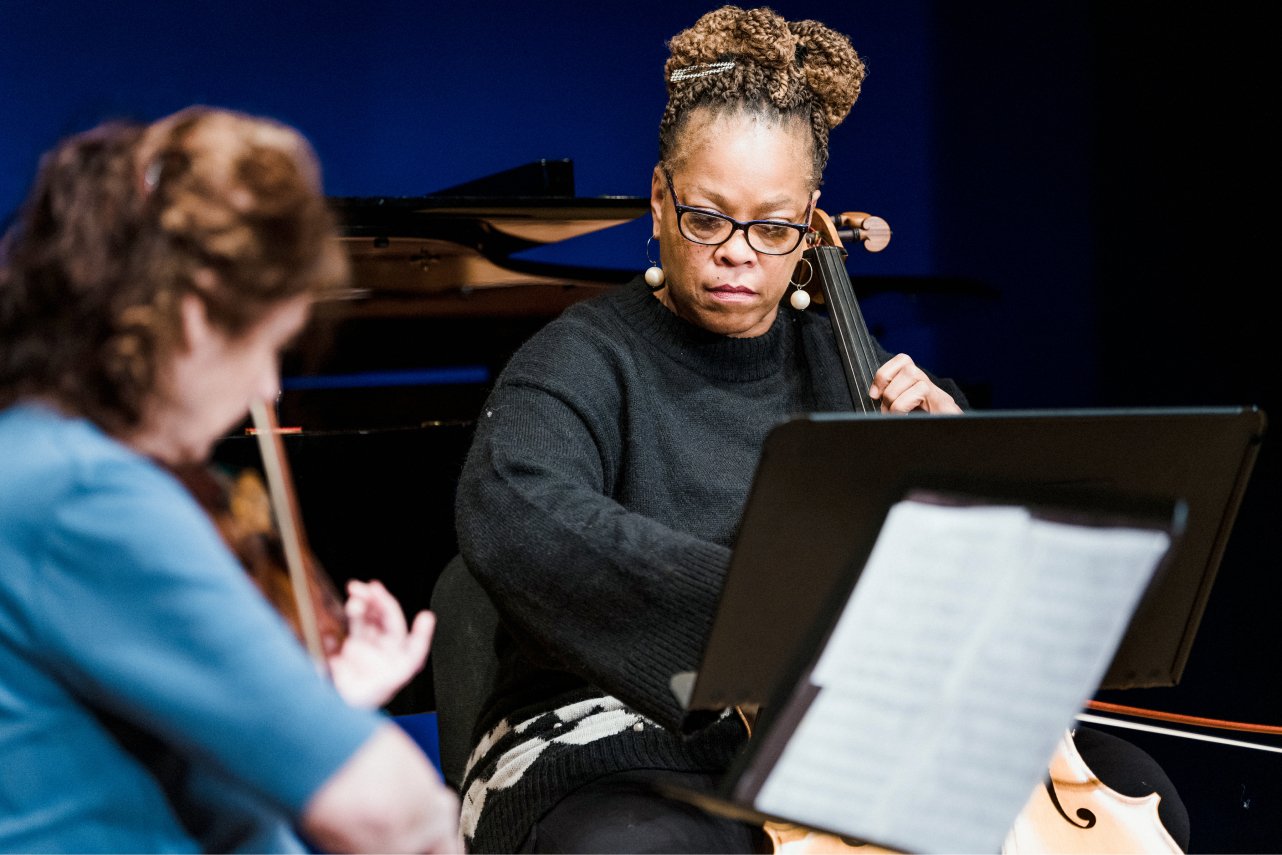
ACMP 2024 Giving Report
ACMP Foundation awarded a total of $199,938 USD in its 2024 fiscal year (August 1, 2023 through July 31, 2024), distributed over five grant programs. These programs touched the lives of an estimated 6391 chamber music players in 16 countries.Read More ↗